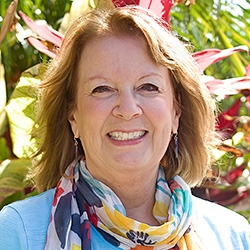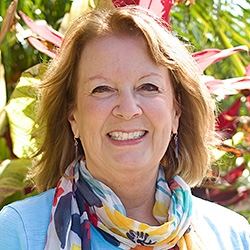
Search Results: intimacy
-
Trainer tip: Do you have behavioral patterns that block intimacy? When we are feeling our most vulnerable, we often want intimacy but also tend to keep it at bay. Acknowledge your need for intimacy, and find people you can trust to love you as you are.
-
Do you crave greater intimacy with your partner? Wish you had more ease for asking for what you want? Join relationship expert, Kelly Bryson in learning practical tips for building intimacy with your partner.
-
-
-
In this brief video, CNVC Certified Trainer and Inner Relationship Focusing Guide and teacher, Gina Cenciose, teaches that our inner relationship is the basis for both Focusing and NVC work.
-
If we befriend our fear we cannot be paralyzed by it. Every fear that arises is a moment to increase our capacity. Fear is connected to something that is precious to us. We also can see what we do to numb our pain and how we try to avoid it. This knowledge can help us to choose healthier strategies to deal with our fears.
-
In life, relationships, and organizations, authenticity is the bedrock of effectiveness. It can give rise to effective dialogues, information flow, intimacy, accountability, decision making and follow through. NVC can give us more tools to live with rigor around our authenticity...
-
Conversation can become more satisfying with depth. Depth is occurs when connection unfolds towards a depth of intimacy, presence, attunement, sensing -- and silent attentive connection where another is attentively seen and heard. Inviting this level of sharing in conversation relies on at least three major elements: attentive silence, the desire to connect and be known, and focus on present moment experience. Learn more about this way of engaging.
-
Shared vulnerability can build more intimacy, mutuality, being seen and heard, empathy, or community. Inviting shared vulnerability means earning another’s trust that you can consistently offer attentive, curious, and compassionate listening. Here are four strategies to invite shared vulnerability.
-
Trainer Tip: Notice where you're judging or blaming people for not meeting your needs. Strive instead to notice and name the related feelings and needs longing to be met. Ask a question to check with the other person about what they want and need. This can open up the conversation towards mutually beneficial solutions.
-

What are the most powerful things I can do to build an inspired relationship? I answered the question with romantic relationships in mind; however, I believe the answer below applies to all important relationships.
-
If you are tired of feeling dissatisfied, frustrated and hopeless about experiencing ease and joy in your intimate relationships, this course is for you! Please join CNVC Certified Trainer and long-time relationship expert, Kelly Bryson, in this course to rethink and relive your perception of love so you can actually feel love, let love in and be love.
-
If you're interested in learning specifically how and what you can do to live compassionately – with plenty of hands-on practice time – this course is for you. Observe actual demonstrations of Robert guiding participants through the transformational territory of healing and integration.
-
Eric offers us a list of some of his favorite books, articles, and videos related to building successful relationships.
-
Living Compassion, for Robert, represents the spirituality that resides in every aspect of Nonviolent Communication. Its foundational principles are represented by three primary qualities or states of being: clarity, compassion and empowerment.
In this course you’ll explore – and practice – how the unfolding of inner clarity opens your way to compassion, which further unfolds into empowerment. Throughout this unfolding process, Robert will include maps and tips for shifting your everyday life from one that is relatively limiting to a life that is both transformative, healing and liberating.
-
During this course, you'll deeply examine this process of blending and integrating your inner and outer selves. Not only will you explore various states of being, such as defensive / protective and being / essence, you'll delve into the primary levels of relationship: to others, to the world and to life, acquire tools for transforming resistance into unconditional acceptance, and much more.
-
The less blame and criticism, the easier it is for others to hear us. From this perspective, it’s in our best interest to come from curiosity and care. This way differences can bring us together and help us know one another. The more mutual understanding, the easier it is to work together and find creative solutions. Read on for more on this, with a story about how a black man inspired 200 members of the KKK to leave the organization.
-
Join Kelly Bryson and go Psychologically and Spiritually Spelunking into your own Caverns of Consciousness, using the inner mining tools of NVC Self-Empathy, Progoff Journaling processes, Focusing, and individual work. Get self-empathy tools that will help you rejuvenate yourself and your relationships.
-
Trainer Tip: Sometimes our actions keep us from meeting our needs. Let’s say you long for connection with others, but you are also afraid of it, so you push people away. Then you tell yourself that no one likes you, resulting in depression and self-criticism. Self-empathy can help clarify what we truly want rather than focusing on what is wrong with others or ourselves, and help us align in ways more likely to meet our needs.
-
What is essential to make a relationship thrive? Listen to CNVC Certified Trainer Mukti Jarvis share seven types of conversations vital to healthy, flourishing intimate relationships.

















